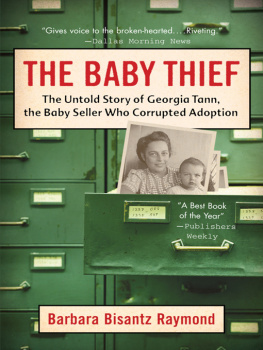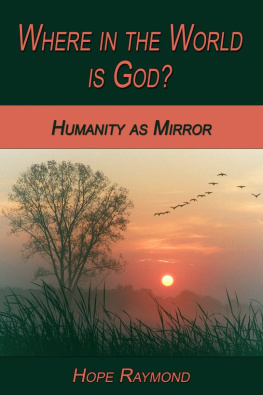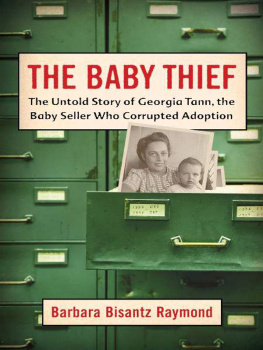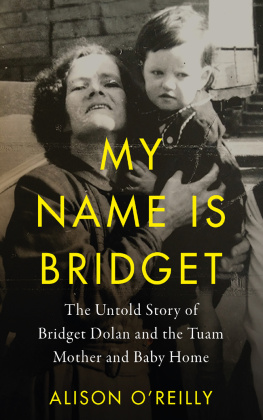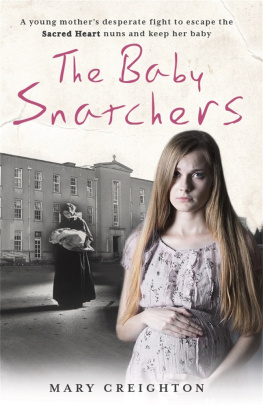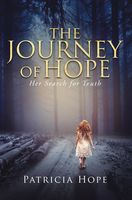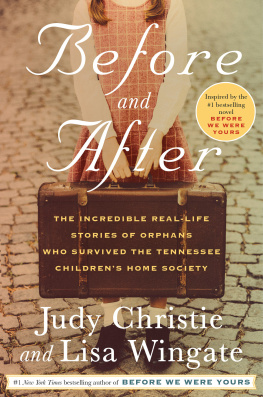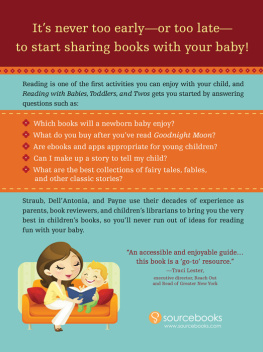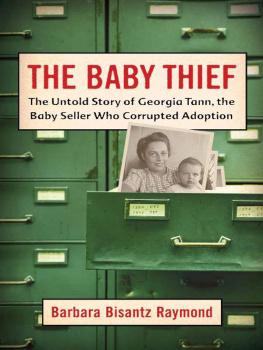Praise for The Baby Thief
Raymond recounts this astonishing and horrifying true story with tremendous self-awareness and intrepid research into Tanns ongoing legacy.The Tampa Tribune
Fascinating, insightful, chilling and compelling. A very important bookand a terrific read.Adam Pertman, Executive Director of the Evan B. Donaldson Adoption Institute and author of Adoption Nation
[D]etails the life of an influential and terribly cruel woman, and the time and place that allowed her to operate. Anyone interested in the welfare of children should read this remarkable book.Larry Brinton, investigative journalist, Nashville, Tennessee
A fascinating, intimate, compelling and heartbreaking story, not just of the infamous babyseller Georgia Tann, but of the treatment of unprotected children throughout history. An extremely important book.Carol Schaefer, author of The Other Mother: A Womans Love for the Child She Gave Up for Adoption
Raymonds dogged investigation makes a strong case for ridding adoptions of lies and secrets, warning that, until we do, Tann and her imitators will continue to corrupt adoption. A rigorous, fascinating, page-turning tale.Publishers Weekly, a starred review
A fascinating dark tale of Ms. Tanns influence [that] gives voice to the brokenhearted children and their birth parents damaged by her actions. [R]iveting. Dallas Morning News
The Baby Thief is a fascinating and important book that illuminates a long buried and horrible episode in American history. A chilling tale of greed that 60 Minutes first broadcast back in 1992, but that continues to this day.Mike Wallace, 60 Minutes correspondent emeritus
Barbara Raymond offers more than a wide-eyed, jaw-dropping account of a monster dressed up as a saint; she gives us a clearly-focused, level-headed, compassionate portrayal of the multiple injustices wrought by a combination of common greed, political corruption, tainted science, systemic neglect and just plain snobbishness.Dr. Trevor Jordan, Senior Lecturer in Applied Ethics in the School of Humanities and Human Services, Queensland University of Technology, Australia
The Baby Thief
The Untold Story of Georgia Tann,
the Baby Seller Who Corrupted Adoption
Barbara Bisantz Raymond

STERLING and the distinctive Sterling logo are
registered trademarks of Sterling Publishing Co., Inc.
Library of Congress Cataloging-in-Publication Data
Raymond, Barbara Bisantz.
The baby thief : the untold story of Georgia Tann, the baby seller who corrupted adoption /Barbara Bisantz Raymond. 1st ed.
p. cm.
Includes bibliographical references and index.
ISBN-13: 978-1-4027-5863-8
ISBN-10: 1-4027-5863-4
1. Tann, Georgia, 1891-1950. 2. AdoptionCorrupt practicesTennessee. 3. Exploitation. 4. AdoptionMoral and ethical aspectsTennessee. I. Title.
HV875.56.T36R39 2008
364.15dc22
2007048258
Cover design:Ann Weinstock;
Photo of file cabinet:Michael Prince/CORBIS;
Photo of woman and child: Carl Mydans/GETTY
2 4 6 8 10 9 7 5 3 1
Published by Sterling Publishing Co., Inc. / Union Square Press
387 Park Avenue South, New York, NY 10016
Originally published in 2007 in hardcover by Carroll & Graf, New York, NY
2007 by Barbara Bisantz Raymond
All rights reserved
ISBN 978-1-4027-8208-4
For information about custom editions, special sales, premium and corporate purchases, please contact Sterling Special Sales Department at 800-805-5489 or specialsales@sterlingpublishing.com.
Contents
Its hard to understand, without being immersed
in the poisonous air of then.
Doris Lessing, Under My Skin, Vol. 1
I learned of Georgia Tann in 1990 from Alma Sipple, whod met her decades earlier. I was interviewing Alma for a magazine piece. She said she could still see Georgia: a stern-looking woman with close-cropped gray hair, round, wireless glasses, and an air of utter authority.
She gained entry to Almas apartment in Memphis, Tennessee, by identifying herself as a social worker and orphanage director concerned about Almas ten-month-old daughter, who had a cold. After examining Irma, Georgia pronounced her seriously ill.
When Alma said she had no money for a doctor, Georgia offered to obtain free treatment by passing Irma off as her ward. She warned Alma not to accompany her daughter to the hospital: If the nurses know youre her mother theyll charge you, she said. Two days later she told Alma that her baby had died.
Alma didnt believe her. But neither frantic visits to Georgias orphanage, from which she was ejected, nor desperate trips to the police station, where she was ignored, nor haunting of hospitals and graveyards revealed the truth: that Georgia had flown Irma to an adoptive home in Ohio.
When I interviewed Alma forty-five years later she had finally found her daughter, but while the reunion had been happy their relationship was fragile. Irma was uncomfortable with the television coverage of the reunion that Alma had sought, and educated enough to intimidate a mother whod only finished sixth grade. What can I get her for Christmas? Alma asked me. Im afraid to insult her with my taste.
A year later Alma had a heart attack and called me from the hospital. She and her daughter were not in touch. Only someone whos lost a child this way can know how horrible it is, Alma said, crying. Theres a hole in me that will never be filled.
I couldnt forget the woman who had ruined Almas life and so many others. Georgia had arranged over five thousand adoptions between 1924 and 1950, many involving children she had kidnapped. She had molested some of the little girls in her care and placed some children with pedophiles.
Georgia had also caused so many child deaths that by the 1930s the official infant mortality rate in Memphis was the highest in the country. And the actual number of Memphis children who died was even larger than the official count, because Georgia failed to report many deaths. She also neglected to bury all of her dead children in the cemetery used by her adoption agency. They simply disappeared, a former Memphian told me.
Still, most of Georgias children survived, and grew up all across the country, many in her favorite markets, Los Angeles and New York. Those adopted by Joan Crawford, June Allyson and Dick Powell, and other celebrities were featured in magazines, and some have had distinguished careers. But most are seemingly ordinary people coping with the extraordinary fact of having been placed with adoptive parents unscreened for anything but wealth.
Some of these adoptive parents loved their new children and treated them well. But other children were made to serve as domestics and farmhands. Some were starved, beaten with hoes and razor strops, hung from hooks, and raped.
There seemed no bottom to the pain Georgia had caused, and I flew to Memphis, consumed by questions. And besides the questions about her and the consequences of her actions there was another one: why hadnt anyone stopped her? She had been expelled from Mississippi before moving to Tennessee. What had made Memphis ripe for her? And what aspects of her era had facilitated her crimes?
Only after situating Georgia within her context would I discover her other dimensionthe one that allowed her to hurt millions more people than those she directly touched. While building her black market business, she had invented modern American adoption.
Its hard to overestimate her influence. When she began her work in Tennessee in the 1920s, adoption as we know it did not exist. Eugenicists had made Americans afraid to adopt, and agencies like the Boston Childrens Aid Society were arranging a scant five adoptions a year. In 1928, however, only four years after Georgias arrival in Memphis, she arranged 206.
Next page
